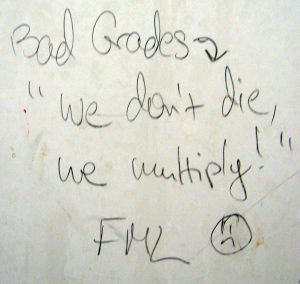 I look back at some of my academic experiences and some of the most important ones were the times that I received bad grades. I do not necessarily mean the times I tried and failed (plenty of ink has been spilled on the virtue of learning from those kinds of mistakes) rather, I mean the times when I accepted the virtues of not following instructions, or not wasting my time. I am referring also to the times when bad grades were results of failures, but not in learning the material. I thought I would share a few of those lessons.
I look back at some of my academic experiences and some of the most important ones were the times that I received bad grades. I do not necessarily mean the times I tried and failed (plenty of ink has been spilled on the virtue of learning from those kinds of mistakes) rather, I mean the times when I accepted the virtues of not following instructions, or not wasting my time. I am referring also to the times when bad grades were results of failures, but not in learning the material. I thought I would share a few of those lessons.
I’ve had the privilege of never struggling in school, and the privilege of being shown that that experience had a correlative rather than causative relationship to my intelligence. A stable, middle class family life and being lucky enough to spend my childhood in good mental and physical health does wonders for one’s ability to succeed in a system that treats every child the same. Additionally, my mother was a teacher, so I had the benefit of success through osmosis, where I absorbed the rules and expectations of the system at home, and was therefore better prepared for navigating the unwritten rules at school. These conditions made things significantly easier for me in ways I am still learning about, but for the purposes of this blog post, they also meant that the bad grades I received really stood out.
The first I want to talk about was a zero I earned on an assignment in my AP Government class. It was a film analysis, I don’t remember the exact prompt, but I remember I didn’t really follow it. Thus the zero. We’d been tasked with watching two films from a list and writing about them, and my selection was The Lives of Others. The film was a revelation, but not in the way the teacher probably intended. I felt compelled to write about the parts of the film that fascinated me, the thinking I had done as a result, how I’d been forced to reconsider my approach to film as an art form rather than as a form of entertainment. Or rather I tried, I was seventeen and incapable of actually expressing any of this with the depth that I felt it. I got the grade back, but somehow couldn’t bring myself to feel disappointed or humiliated by it. I didn’t argue it, and in some ways felt a little proud of it. It was freeing. I didn’t demonstrate mastery of the knowledge I’d been asked to gain, but I had gained something valuable nevertheless.
This moment was hugely important for me, I learned that my grades didn’t reflect my identity or worth, and I learned the importance of breaking rules. School so often rewards following instructions rather than learning, and with that assignment I figured out that sometimes writing what you actually learned is more important than following instructions. I took the opportunity of that essay to process the film in the way that suited my needs at that moment and as a result I have carried the impact of that film a lot longer than I might have if I’d done as instructed. Most importantly, I took my first tentative steps from learning to pass, to learning to think for myself in an academic way. I was lucky enough to have that lesson reinforced later in the year by that same teacher when she assured me, after I complained that other students were quoting the arguments of another teacher, that thinking for yourself was something we would all be forced to do in college. She was, and still is an excellent teacher, and I was “conventionally” successful in that class due in no small part to her excellent tutelage. But the most valuable lesson, or at least the one I use the most, is the one she gave me the space to learn by accident. I’m still so grateful she gave me a head start in figuring out how to be me.
 My second experience with bad grades was in college, this time, I learned when to speak up for myself. I was taking a language course at a different university (a particularly awesome benefit of the college I attended) and had been placed in the beginners course pending an interview with the department head before moving to the intermediate level. This process took two weeks, and on the third week I finally got to join the class. That day they were taking a quiz on the unit they had finished the week before and I was offered the opportunity to take the quiz or sit through the class and not participate. I chose to take the test so that I could see what everyone had been learning and to get a sense of how I measured up. I didn’t realise the Professor would decide that the grade I received (an F) should be part of my average. I’d assumed that not having gotten to learn everything along with the rest of the class, the professor would grade the quiz and then not count it, thereby allowing me to see what material I needed to catch up on without penalising me for administrative problems I had no control over. I ended up working the entire semester to try to remove the grade (to no avail) and then to perform well enough in every other assignment that I would still pass the class. I did, but barely. I still wish I had made a bigger fuss and done more to contest that grade because it did not fairly reflect my work.
My second experience with bad grades was in college, this time, I learned when to speak up for myself. I was taking a language course at a different university (a particularly awesome benefit of the college I attended) and had been placed in the beginners course pending an interview with the department head before moving to the intermediate level. This process took two weeks, and on the third week I finally got to join the class. That day they were taking a quiz on the unit they had finished the week before and I was offered the opportunity to take the quiz or sit through the class and not participate. I chose to take the test so that I could see what everyone had been learning and to get a sense of how I measured up. I didn’t realise the Professor would decide that the grade I received (an F) should be part of my average. I’d assumed that not having gotten to learn everything along with the rest of the class, the professor would grade the quiz and then not count it, thereby allowing me to see what material I needed to catch up on without penalising me for administrative problems I had no control over. I ended up working the entire semester to try to remove the grade (to no avail) and then to perform well enough in every other assignment that I would still pass the class. I did, but barely. I still wish I had made a bigger fuss and done more to contest that grade because it did not fairly reflect my work.
I did learn that I can and should speak up for myself. It’s a lesson I’ve had to have reiterated many times, and one I still often fail. But I’m glad I had the opportunity to learn it in a relatively safe environment and with comparatively little at stake. I’ve not been prevented from succeeding in academia by that grade, and I figured out that the number or letter on the page was not always the best indicator of success. Grades matter, but you can decide how they matter, and what lessons you value learning from them.






